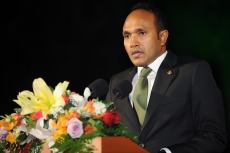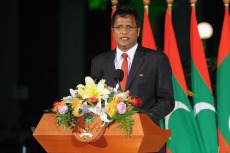This article first appeared on Manzaru. Republished with permission.
As a Maldivian woman, and as a pursuer of Islamic scholarship, the issue of how Islamic scholarship relates to the women of this country is one that I have been faced with at various points of my academic and personal life. One thing, I found, is undeniable – there are huge challenges for women in the field of Islamic scholarship in our country.
In the Maldives, Islamic scholarship – at least on the level of public discourse – is a field almost completely monopolised by men. In Maldives, an Islamic scholar must have a beard, at least the potential to have one. A Maldivian Islamic scholar must wear his pants short, or at least must be able to do so without uncovering part of his awrah. Women, by their very nature, are unable to fulfill these conditions.
It is true that as a principle, Islam does not prevent women from studying Islamic sciences or from preaching Islam based on their knowledge. Aisha, my namesake – I have always been proud to say – and the Prophet’s wife (Peace be upon him and may Allah be pleased with her) is an Islamic scholar, who is shown as a role model to Muslim women. It is also true that many women, including myself, have been issued licenses to preach Islam by the Ministry of Islamic Affairs, and previously by the Supreme Council for Islamic Affairs. One must ask, however, how often these women do, or are given the opportunity to, address an audience at all, not to mention one comprising both genders. One cannot help but wonder whom among these women is given the opportunity to be at the forefront of the Maldivian stage of the eternal strife to promote Islam.
Thus, all issues relating to women are given but a rather reluctant and half-baked coverage – women’s education, women’s employment, marital responsibilities, family commitment, etc, are all discussed only from a man’s perspective.
The current discourse of Maldivian scholars on women’s education and employment is impractical, if not illogical. It is their stand that Islam does not prevent women from pursuing higher education. Women, in fact, are encouraged to pursue a degree in professional fields such as medicine, education, law, psychology, etc. After all, women do need the services of doctors, educators and lawyers. Who better to provide these services to women than female professionals? Thus, Maldivian women are encouraged by Islamic scholars to build dreams upon dreams of a professional career along side those of love, husband, children, family and home.
The oxymoron presents itself once these women – after having spent several years toiling away under thick volumes of reports and case studies, being trainee teachers under the supervision of stricter than hell supervisors, dissecting dead bodies, attending to injuries, and assisting surgeons in operation theatres – choose to fulfill the Sunnah of marriage and forming a family. Now, there’s no denying that the primary role of a woman upon marriage is that of a wife – and upon having a child is that of a mother. But if women are encouraged to train as professionals, should women also not be encouraged to work as professionals? Should women not be provided with suitable circumstances where they can pursue a career without undermining their roles as wives and mothers?
Unfortunately, all that I’ve heard to this day from Maldivian scholars is that women should be content to be housewives, and that being a mother is the biggest honour of all.
The same goes for the issues of marital responsibilities and family commitment. I heard a Sheikh recently speaking on radio of men who work all day and return home only to find an unwelcoming wife at home. It was his claim that this is one of the main contributors to the breakdown of marriages in our society. While I do not deny that many men do in fact grind daily to earn a good living for their families, I can’t help but wonder whether women do nothing at all. The way I understand it, it is a division of labour – women ought to take care of the family, men are the bread-winners. Neither task is more important than the other – neither can be considered harder, or easier than the other. In the end, both partners of the marriage are supposed to provide each other with support.
When a man returns from office, returns from work and spends all his time going out with friends, reading the news, or watching television, is he not neglecting part of his responsibilities? Could it not be that a woman whose emotional needs and expectations from her husband is more likely to be unwelcoming to him wheh he comes home from work to change and go meet with his friends?
The half-bakedness of the scholarly address applies even to the issue of Hijab. This age-old issue, discussed, re-discussed, and then discussed yet again has been focused only on women. The focus of the Hijab issue is so much on the female gender that one cannot help but wonder that perhaps an awrah is defined in Islam only for women. I recently watched a televised sermon of a Maldivian Islamic scholar in which he recited verses 29 and 30 of Surah Al-Nur which translate as follows:
Tell the believing men to reduce [some] of their vision and guard their private parts. That is purer for them. Indeed, Allah is Acquainted with what they do. (29) And tell the believing women to reduce [some] of their vision and guard their private parts and not expose their adornment except that which [necessarily] appears thereof and to wrap [a portion of] their headcovers over their chests and not expose their adornment except to their husbands, their fathers, their husbands’ fathers, their sons, their husbands’ sons, their brothers, their brothers’ sons, their sisters’ sons, their women, that which their right hands possess, or those male attendants having no physical desire, or children who are not yet aware of the private aspects of women. And let them not stamp their feet to make known what they conceal of their adornment. And turn to Allah in repentance, all of you, O believers, that you might succeed. (30)
Unfortunately, although the Quran first commands men to lower their gaze from viewing Haraam and to protect themselves from committing illicit deeds, the Sheikh only translated the verse that relates to women’s Hijab. Allah’s Command to believing men was purposely ignored.
Such oversight may perhaps be excused if Maldivian men do generally follow the Command to lower the gaze and guard the chastity. This, sadly, does not seem to be the case. Allah is Most Gracious, Most Wise – he limited man’s awrah to what is comprised between the navel and the knees – as opposed to the whole body of the woman, with a few body parts being the exception. Even so, many men – especially, many young men – seem unable even to cover this small area. In order to follow pop fashion – or, hip hop fashion (you name it) – many young men deem it necessary to let their pants fall way below their waist, not to mention that they deem it unnecessary to wear undergarments. The result – I’d rather not divulge in.
Another issue not to be forgotten is that of pornography. Maldivian Muslim men, like their brothers all around the world, seem to be acting under the impression that as long as you don’t view the awrah of a Muslim woman, it is permissible to view the awrah of other women in general. In the end, the general effect of dehumanising and objectifying women has been unavoidable. Reports of sexual crimes against the female gender, including crimes against children and the elderly, have been on the rise in Maldives – it is impossible to say whether the rise is in the number of crimes or the amount of reports (it in all probability is both) – and all that Maldivian scholars have been able to say is that women should cover themselves better and the government should implement Hudud.
It is my belief that Maldivian scholars find it easy to speak the same words and to address the same issues in the age-old manner without looking at them from any different angles. And this, I believe, is the ultimate wrong.
I do realise that I am only raising issues here – I have not proposed any solutions.
I have, however, started my own personal swim against the tide. I have chosen to have a child and to work. I have decided that I, as the mother of my child, will take the primary responsibility of feeding, bathing, playing with and rearing my child. I will not delegate these pleasures to a maid or babysitter. I have also decided that I, as a graduate of Shari’ah and law, will practice the law. I will pursue a career, but on my own terms. I work from home. And because my child is a toddler now – who rarely sleeps during the day and refuses to leave me and the laptop alone – I work when he, along with the rest of the world, sleeps.
Is it easy? No. Is it a sustainable solution? Definitely not. By Thursday – weekends in Maldives are Fridays and Saturdays, and that’s when I sleep – I can’t wait for the week to end. I am always wishing for one more hour in the day and a few more minutes to the hour. But, for me, it is a start.
I also have chosen to start my journey, preaching and pursuing the values of Islam, by addressing issues that many other graduates of the Shariah are shying away from. I do this with the full understanding that this is a path filled with obstacles. Be it as it may, it is my belief, that if no one else will, I ought to do the hard – and perhaps the right – thing.
I am a Maldivian woman. I am a pursuer of Islamic scholarship. I swim against the tide.
All comment pieces are the sole view of the author and do not reflect the editorial policy of Minivan News. If you would like to write an opinion piece, please send proposals to [email protected]
Likes (1)Dislikes
(1)Dislikes (0)
(0)  National Pride
National Pride
